外研版(2019)必修 第一册Unit 1 A new start Review名师课件(共37张PPT)
文档属性
| 名称 | 外研版(2019)必修 第一册Unit 1 A new start Review名师课件(共37张PPT) |  | |
| 格式 | pptx | ||
| 文件大小 | 1.3MB | ||
| 资源类型 | 教案 | ||
| 版本资源 | 外研版(2019) | ||
| 科目 | 英语 | ||
| 更新时间 | 2023-02-25 21:44:40 | ||
图片预览

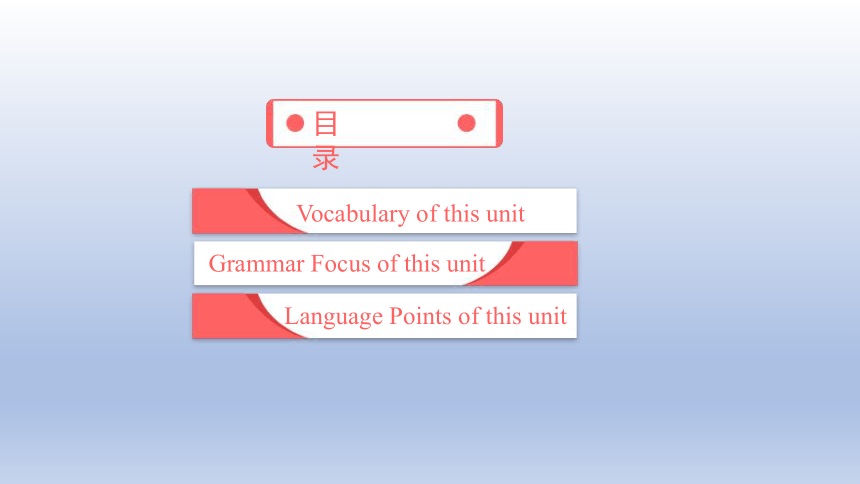
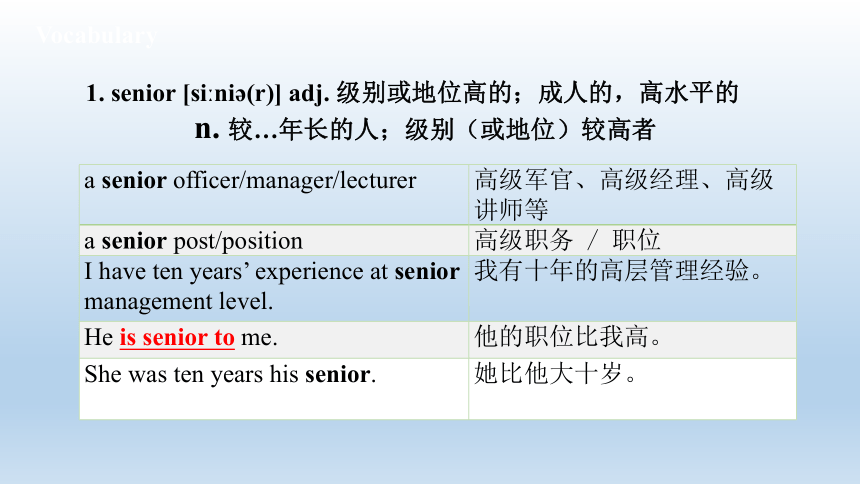
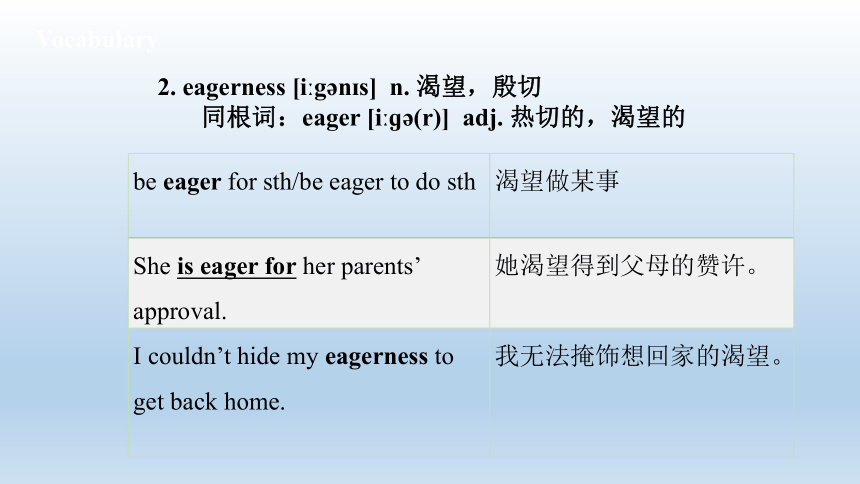
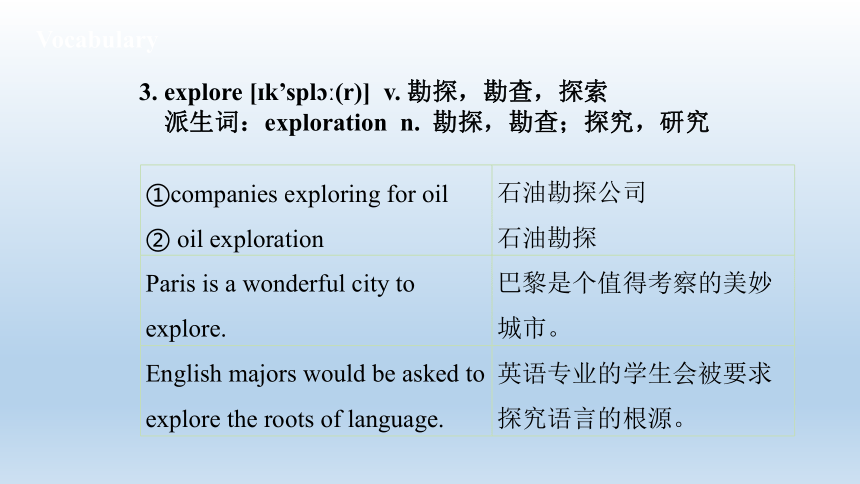
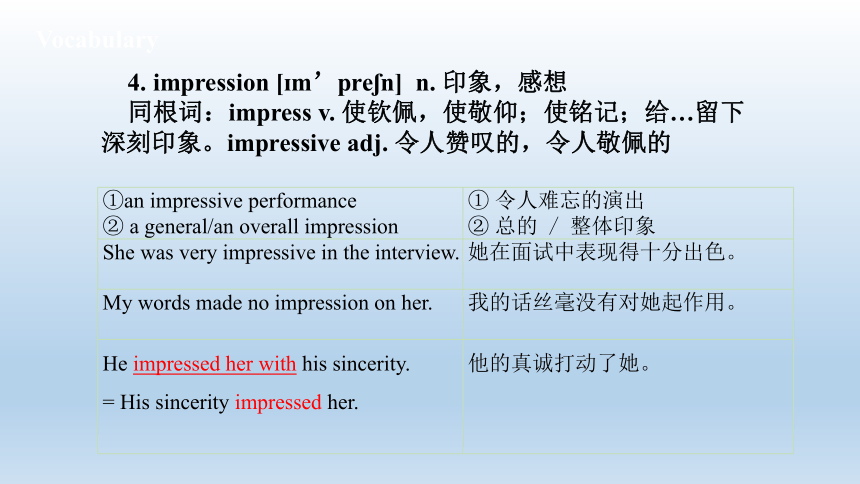
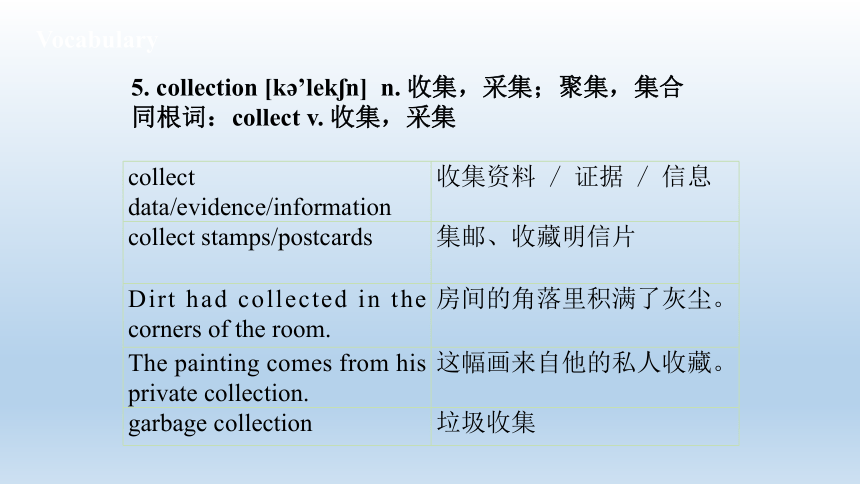
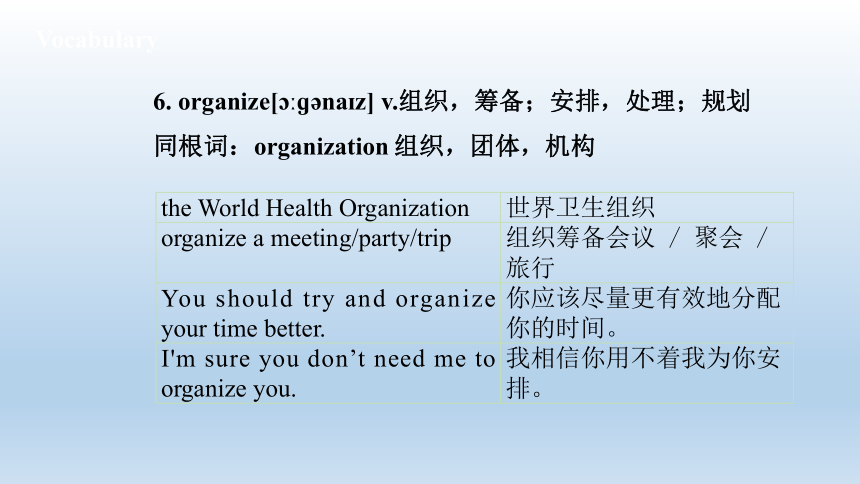
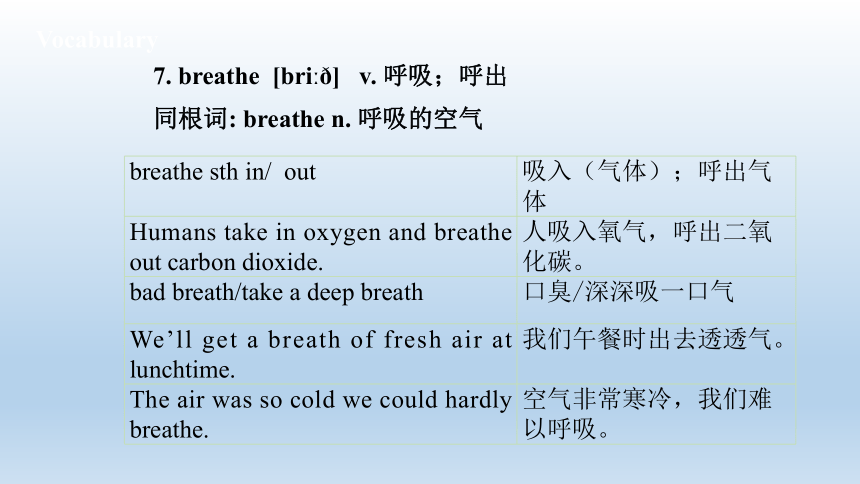
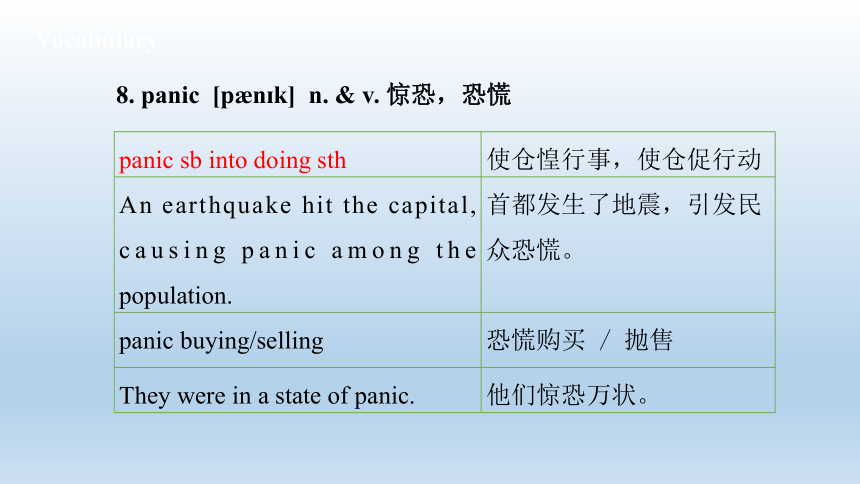
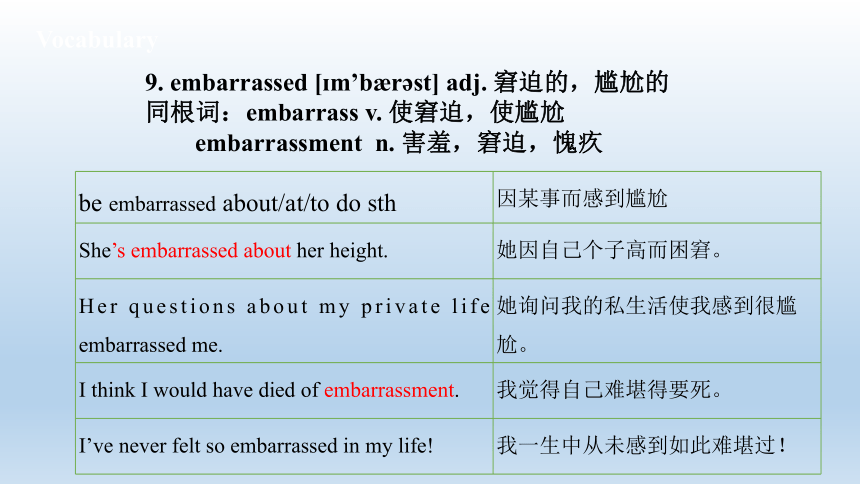
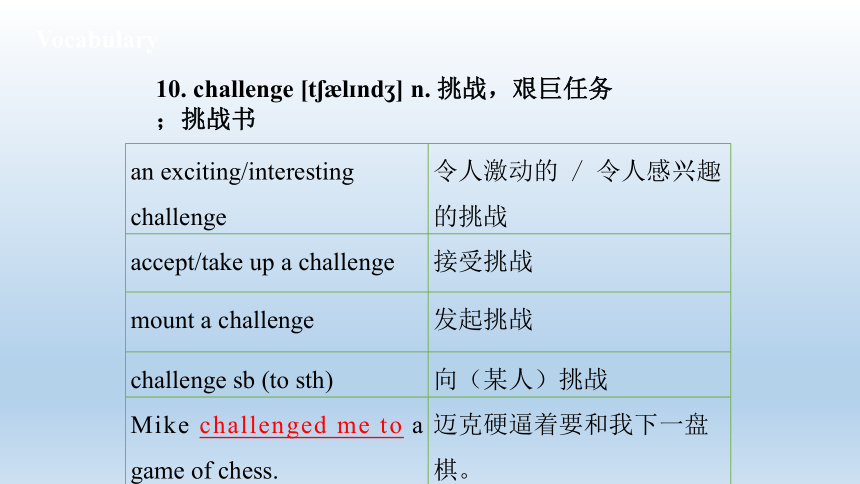
文档简介
(共37张PPT)
Unit 1 Review
目 录
Vocabulary of this unit
Grammar Focus of this unit
Language Points of this unit
Vocabulary
a senior officer/manager/lecturer 高级军官、高级经理、高级讲师等
a senior post/position 高级职务 / 职位
I have ten years’ experience at senior management level. 我有十年的高层管理经验。
He is senior to me. 他的职位比我高。
She was ten years his senior. 她比他大十岁。
1. senior [si ni (r)] adj. 级别或地位高的;成人的,高水平的
n. 较…年长的人;级别(或地位)较高者
be eager for sth/be eager to do sth 渴望做某事
She is eager for her parents’ approval. 她渴望得到父母的赞许。
I couldn’t hide my eagerness to get back home. 我无法掩饰想回家的渴望。
2. eagerness [i g n s] n. 渴望,殷切
同根词:eager [i ɡ (r)] adj. 热切的,渴望的
Vocabulary
Vocabulary
①companies exploring for oil ② oil exploration 石油勘探公司
石油勘探
Paris is a wonderful city to explore. 巴黎是个值得考察的美妙城市。
English majors would be asked to explore the roots of language. 英语专业的学生会被要求探究语言的根源。
3. explore [ k’spl (r)] v. 勘探,勘查,探索
派生词:exploration n. 勘探,勘查;探究,研究
①an impressive performance ② a general/an overall impression ① 令人难忘的演出
② 总的 / 整体印象
She was very impressive in the interview. 她在面试中表现得十分出色。
My words made no impression on her. 我的话丝毫没有对她起作用。
He impressed her with his sincerity. = His sincerity impressed her. 他的真诚打动了她。
4. impression [ m’pre n] n. 印象,感想
同根词:impress v. 使钦佩,使敬仰;使铭记;给…留下深刻印象。impressive adj. 令人赞叹的,令人敬佩的
Vocabulary
collect data/evidence/information 收集资料 / 证据 / 信息
collect stamps/postcards 集邮、收藏明信片
Dirt had collected in the corners of the room. 房间的角落里积满了灰尘。
The painting comes from his private collection. 这幅画来自他的私人收藏。
garbage collection 垃圾收集
5. collection [k ’lek n] n. 收集,采集;聚集,集合
同根词:collect v. 收集,采集
Vocabulary
the World Health Organization 世界卫生组织
organize a meeting/party/trip 组织筹备会议 / 聚会 / 旅行
You should try and organize your time better. 你应该尽量更有效地分配你的时间。
I'm sure you don’t need me to organize you. 我相信你用不着我为你安排。
Vocabulary
6. organize[ ɡ na z] v.组织,筹备;安排,处理;规划
同根词:organization 组织,团体,机构
Vocabulary
7. breathe [bri ] v. 呼吸;呼出
同根词: breathe n. 呼吸的空气
breathe sth in/ out 吸入(气体);呼出气体
Humans take in oxygen and breathe out carbon dioxide. 人吸入氧气,呼出二氧化碳。
bad breath/take a deep breath 口臭/深深吸一口气
We’ll get a breath of fresh air at lunchtime. 我们午餐时出去透透气。
The air was so cold we could hardly breathe. 空气非常寒冷,我们难以呼吸。
Vocabulary
panic sb into doing sth 使仓惶行事,使仓促行动
An earthquake hit the capital, causing panic among the population. 首都发生了地震,引发民众恐慌。
panic buying/selling 恐慌购买 / 抛售
They were in a state of panic. 他们惊恐万状。
8. panic [p n k] n. & v. 惊恐,恐慌
Vocabulary
be embarrassed about/at/to do sth 因某事而感到尴尬
She’s embarrassed about her height. 她因自己个子高而困窘。
Her questions about my private life embarrassed me. 她询问我的私生活使我感到很尴尬。
I think I would have died of embarrassment. 我觉得自己难堪得要死。
I’ve never felt so embarrassed in my life! 我一生中从未感到如此难堪过!
9. embarrassed [ m’b r st] adj. 窘迫的,尴尬的
同根词:embarrass v. 使窘迫,使尴尬
embarrassment n. 害羞,窘迫,愧疚
an exciting/interesting challenge 令人激动的 / 令人感兴趣的挑战
accept/take up a challenge 接受挑战
mount a challenge 发起挑战
challenge sb (to sth) 向(某人)挑战
Mike challenged me to a game of chess. 迈克硬逼着要和我下一盘棋。
10. challenge [t l nd ] n. 挑战,艰巨任务;挑战书
Vocabulary
Vocabulary
A debate on/about/over sth 一个关于……的辩论
After a long debate, Congress approved the proposal. 经过长时间辩论,国会通过了这项提议。
a heated/wide-ranging/lively debate 激烈的 / 广泛的 / 热烈的争论
The United Nations Security Council will debate the issue today. 联合国安理会今天将就这个问题展开讨论。
11. debate [d ’be t] v. & n. 辩论
argue with sb (about/over sth) 与某人(因某事)争吵
My brothers are always arguing. 我的兄弟们总是争论不休。
argue sb into/out of doing sth 说服(某人)做 / 不做(某事)
They argued him into withdrawing his complaint. 他们说服他撤回了投诉。
12. argue [’ɑ ɡju ] v. 争论,争吵,争辩
Vocabulary
Vocabulary
a highly intelligent child 非常聪明的孩子
intelligent software/systems 智能软件 / 系统
He’s a highly intelligent man. 他是一个很有才智的人。
She asked a lot of intelligent questions. 她问了许多机智的问题。
13. intelligent [ n’tel d nt] adj. 有才智的,悟性强的
Vocabulary
Which journals does the library subscribe to 图书馆订有哪些报刊?
subscribe to sth 同意,赞成
We subscribe to the resolution. 我们赞同这项决议。
I’ve personally never subscribed to the view that either sex is superior to the other. 我个人从来都不同意性别有优劣之分的观点。
14. subscribe [s b’skra b] v. 定期订购(或订阅等); 定期交纳
Vocabulary
in view of sth 鉴于,考虑到,由于
In view of the weather, the event will now be held indoors. 由于天气的缘故,这项赛事将在室内进行。
with a view to sth/to doing sth 为了,指望
He’s painting the house with a view to selling it. 他在粉刷房子,想把它卖掉。
have different/conflicting/opposing views 有不同的 / 矛盾的 / 相反的观点
The lake soon came into view. 那湖很快映入眼帘。
15. view [vju ] n. 看法,意见,见解;视野,视域,视线;景色,风景
v. 把…视为,以…看待
Vocabulary
frighten/scare sb to death 把某人吓得要命
be frightened of doing/to do sth 害怕做某事
What are you frightened of 你怕什么?
a frightening experience/prospect/thought 可怕的经历 / 景象 / 想法
16. frightened [’fra tnd] adj. 惊吓的,受惊的,害怕的
同根词:frightening [’fra tn ] adj. 令人恐惧的
frighten [’fra tn] v. 使惊吓,使惊恐
lose your sight 失明
She has very good sight. 她的视力很好。
We’re going to Paris for the weekend to see the sights. 我们打算去巴黎过周末,参观那里的名胜。
He’s painting the house with a view to selling it. 他在粉刷房子,想把它卖掉。
at first sight 乍一看,初看时
out of sight, out of mind 眼不见,心不想
17. sight [sa t] n. 视力,视觉;视力范围,视野;名胜,风景
Vocabulary
Vocabulary
the latest trade/sales/unemployment figures 最新的贸易、销售、失业等数字
By 2004, this figure had risen to 14 million. 到2004 年为止,这个数字已增长到 1 400 万。
a six-figure salary 六位数的薪水
He’s painting the house with a view to selling it. 他在粉刷房子,想把它卖掉。
Are you any good at figures 你的算术好吗?
a political figure 政治人物
I’m watching my figure. 我一直注意保持身材。
18. figure [’f ɡ (r)] n. 数字;位数;人物;身材,体形
Vocabulary
in particular 尤其,特别,格外
He loves science fiction in particular. 他特别喜爱科幻小说。
Peter was lying on the sofa doing nothing in particular. 彼得躺在沙发上,无所事事。
be particular about 对……感到挑剔
She’s very particular about her clothes. 她对衣着特别挑剔。
19. particular [p ’t kj l (r)] adj. 专指的,特指的
Grammar Focus
【要义详析】
一、句子的基本成分
根据英语词汇在句子中的地位和作用, 英语的句子成分可分为主语、谓语、表语、宾语、定语、状语、宾语补足语、同位语及独立成分等。
Grammar Focus
1. 主语: 表示句子说的是什么人或什么事。
通常由名词、代词、数词、名词化的形容词、动词不定式、动名词、从句等充当。
Grammar Focus
*Jane is good at playing the piano. (名词)
*She went out in a hurry. (代词)
*To see is to believe. (动词不定式)
*Smoking is bad for health. (动名词)
2. 谓语: 说明主语做什么或怎么样。通常由动词或动词短语充当, 位于主语之后。实义动词可以单独作谓语, 连系动词需要和表语一起构成谓语; 情态动词和助动词需要和实义动词一起构成谓语。
*We love China. (实义动词)
*He can speak English. (情态动词+实义动词)
*We have finished reading this book. (助动词+实义动词)
Grammar Focus
3. 表语: 用以说明主语的身份、特征和状态。一般位于系动词之后, 由名词、代词、形容词、分词、数词、不定式、动名词、介词短语、副词及表语从句充当。
*His words sounded reasonable. (形容词)
*She is in good health. (介词短语)
*My father is a professor. (名词)
Grammar Focus
4. 宾语: 表示动作的对象或承受者, 一般位于及物动词和介词后面。常由名词、代词、动名词、不定式或相当于名词的词组和句子充当。
(1)直接宾语表示动作的承受者或结果, 通常指物。
(2)间接宾语表示动作的接受者或指向, 它位于直接宾语之前; 位于直接宾语之后时, 其前面则常加介词to或for
*She has a very pleasant smile. (名词)
*I think (that) he is fit for his office. (从句)
*Lend me your dictionary, please. (间接宾语和直接宾语)
Grammar Focus
5. 宾语补足语: 补充说明宾语的成分叫宾语补足语。一般由形容词、名词、副词、不定式、分词和介词短语等充当。
*His father named him Dongming. (名词)
*They painted their boat white. (形容词)
*Let the fresh air in. (副词)
*You mustn’t force him to lend his money to you. (动词不定式)
Grammar Focus
6. 定语: 修饰名词或代词的词、短语或从句称为定语。一般由形容词、名词、代词、数词、副词、不定式、动名词、分词、介词短语和从句等充当。单词作定语时通常放在它所修饰的名词之前; 短语和从句作定语时则放在它所修饰的名词之后。
*China is a developing country while America is a developed country.
中国是一个发展中国家而美国是一个发达国家。(分词)
*There are thirty women teachers in our school.
我们学校有三十名女老师。(名词)
*Our monitor is always the first to enter the classroom.
我们的班长总是第一个进入教室的。(动词不定式)
Grammar Focus
7. 状语: 修饰动词、形容词、副词或整个句子, 说明动作或状态特征的句子成分, 叫做状语。一般由副词、名词、数词、形容词、不定式、分词、介词短语、独立主格和从句等充当。
*I am very pleased to see you. (副词)
*I’ll be back in a while. (介词短语)
*Once you begin, you must continue. (从句)
Grammar Focus
【名师点津】若时间状语和地点状语同时出现在一个句子中时, 通常先说地点状语, 再说时间状语; 但是如果对这两个状语同时提问时, 则用when and where。
*They held a meeting in the hall yesterday afternoon.
昨天下午他们在大厅里开了一个会议。
*When and where did they hold a meeting
他们何时何地开了一个会议
Grammar Focus
【即学活用】
按照要求写出下列句子中的成分
(1)The young should respect the old.
(主语__________)
(2)He studied hard all day long.
(谓语_______)
The young
studied
Grammar Focus
(3)His hobby is playing football.
(表语______________)
(4)He pretended not to see me.
(宾语____________)
(5)We found everything in the lab in good order.
(宾语补足语: ____________)
playing football
not to see me
in good order
Grammar Focus
(6)He is reading an article about how to learn English.
(定语: ________________________)
(7)He is in the room making a model plane.
(状语: ___________________)
about how to learn English
making a model plane
Grammar Focus
Grammar Focus
Everyone laughed loudly.(主语+谓语+状语)
I want to make a good first impression.(主语+谓语+宾语)
I was wrong. (主语+系动词+表语)
I found most of my classmates and teaches friendly and helpful. (主语+谓语+宾语+宾补)
Basic sentence structure
Language Points
Important Sentence Patterns
1. was/were doing...when...正在做……这时
I was looking at the photos on the noticeboard when I heard a voice behind me.
[仿写] 当妈妈回家的时候我正在写作业。
I was doing my homework when my mother came back home.
2. 感叹句型
How true these words were!
[仿写] 这则令人震惊的消息使我意识到我们将会面临多么严重的问题!
The shocking news made me realize what terrible problems we would face!
3. too...to...太……而不能……
I had been too nervous to pay attention when he introduced himself!
[仿写] 当她听到这个消息时激动得说不出话来。
She was too excited to say a word when she heard the news.
4. 形式主语
It’s a fantastic opportunity for new students to get to know the school and other students.
[仿写] 我认为他有可能接受我们的邀请。
I think it is possible for him to accept our invitation.
5. so...that...如此……以至于……
...but the teacher spoke so fast that I couldn’t take everything down.
[仿写] 他如此气愤,结果一句话也没说就离开了房间。
He was so angry that he left the room without a word.
Language Points
Unit 1 Review
目 录
Vocabulary of this unit
Grammar Focus of this unit
Language Points of this unit
Vocabulary
a senior officer/manager/lecturer 高级军官、高级经理、高级讲师等
a senior post/position 高级职务 / 职位
I have ten years’ experience at senior management level. 我有十年的高层管理经验。
He is senior to me. 他的职位比我高。
She was ten years his senior. 她比他大十岁。
1. senior [si ni (r)] adj. 级别或地位高的;成人的,高水平的
n. 较…年长的人;级别(或地位)较高者
be eager for sth/be eager to do sth 渴望做某事
She is eager for her parents’ approval. 她渴望得到父母的赞许。
I couldn’t hide my eagerness to get back home. 我无法掩饰想回家的渴望。
2. eagerness [i g n s] n. 渴望,殷切
同根词:eager [i ɡ (r)] adj. 热切的,渴望的
Vocabulary
Vocabulary
①companies exploring for oil ② oil exploration 石油勘探公司
石油勘探
Paris is a wonderful city to explore. 巴黎是个值得考察的美妙城市。
English majors would be asked to explore the roots of language. 英语专业的学生会被要求探究语言的根源。
3. explore [ k’spl (r)] v. 勘探,勘查,探索
派生词:exploration n. 勘探,勘查;探究,研究
①an impressive performance ② a general/an overall impression ① 令人难忘的演出
② 总的 / 整体印象
She was very impressive in the interview. 她在面试中表现得十分出色。
My words made no impression on her. 我的话丝毫没有对她起作用。
He impressed her with his sincerity. = His sincerity impressed her. 他的真诚打动了她。
4. impression [ m’pre n] n. 印象,感想
同根词:impress v. 使钦佩,使敬仰;使铭记;给…留下深刻印象。impressive adj. 令人赞叹的,令人敬佩的
Vocabulary
collect data/evidence/information 收集资料 / 证据 / 信息
collect stamps/postcards 集邮、收藏明信片
Dirt had collected in the corners of the room. 房间的角落里积满了灰尘。
The painting comes from his private collection. 这幅画来自他的私人收藏。
garbage collection 垃圾收集
5. collection [k ’lek n] n. 收集,采集;聚集,集合
同根词:collect v. 收集,采集
Vocabulary
the World Health Organization 世界卫生组织
organize a meeting/party/trip 组织筹备会议 / 聚会 / 旅行
You should try and organize your time better. 你应该尽量更有效地分配你的时间。
I'm sure you don’t need me to organize you. 我相信你用不着我为你安排。
Vocabulary
6. organize[ ɡ na z] v.组织,筹备;安排,处理;规划
同根词:organization 组织,团体,机构
Vocabulary
7. breathe [bri ] v. 呼吸;呼出
同根词: breathe n. 呼吸的空气
breathe sth in/ out 吸入(气体);呼出气体
Humans take in oxygen and breathe out carbon dioxide. 人吸入氧气,呼出二氧化碳。
bad breath/take a deep breath 口臭/深深吸一口气
We’ll get a breath of fresh air at lunchtime. 我们午餐时出去透透气。
The air was so cold we could hardly breathe. 空气非常寒冷,我们难以呼吸。
Vocabulary
panic sb into doing sth 使仓惶行事,使仓促行动
An earthquake hit the capital, causing panic among the population. 首都发生了地震,引发民众恐慌。
panic buying/selling 恐慌购买 / 抛售
They were in a state of panic. 他们惊恐万状。
8. panic [p n k] n. & v. 惊恐,恐慌
Vocabulary
be embarrassed about/at/to do sth 因某事而感到尴尬
She’s embarrassed about her height. 她因自己个子高而困窘。
Her questions about my private life embarrassed me. 她询问我的私生活使我感到很尴尬。
I think I would have died of embarrassment. 我觉得自己难堪得要死。
I’ve never felt so embarrassed in my life! 我一生中从未感到如此难堪过!
9. embarrassed [ m’b r st] adj. 窘迫的,尴尬的
同根词:embarrass v. 使窘迫,使尴尬
embarrassment n. 害羞,窘迫,愧疚
an exciting/interesting challenge 令人激动的 / 令人感兴趣的挑战
accept/take up a challenge 接受挑战
mount a challenge 发起挑战
challenge sb (to sth) 向(某人)挑战
Mike challenged me to a game of chess. 迈克硬逼着要和我下一盘棋。
10. challenge [t l nd ] n. 挑战,艰巨任务;挑战书
Vocabulary
Vocabulary
A debate on/about/over sth 一个关于……的辩论
After a long debate, Congress approved the proposal. 经过长时间辩论,国会通过了这项提议。
a heated/wide-ranging/lively debate 激烈的 / 广泛的 / 热烈的争论
The United Nations Security Council will debate the issue today. 联合国安理会今天将就这个问题展开讨论。
11. debate [d ’be t] v. & n. 辩论
argue with sb (about/over sth) 与某人(因某事)争吵
My brothers are always arguing. 我的兄弟们总是争论不休。
argue sb into/out of doing sth 说服(某人)做 / 不做(某事)
They argued him into withdrawing his complaint. 他们说服他撤回了投诉。
12. argue [’ɑ ɡju ] v. 争论,争吵,争辩
Vocabulary
Vocabulary
a highly intelligent child 非常聪明的孩子
intelligent software/systems 智能软件 / 系统
He’s a highly intelligent man. 他是一个很有才智的人。
She asked a lot of intelligent questions. 她问了许多机智的问题。
13. intelligent [ n’tel d nt] adj. 有才智的,悟性强的
Vocabulary
Which journals does the library subscribe to 图书馆订有哪些报刊?
subscribe to sth 同意,赞成
We subscribe to the resolution. 我们赞同这项决议。
I’ve personally never subscribed to the view that either sex is superior to the other. 我个人从来都不同意性别有优劣之分的观点。
14. subscribe [s b’skra b] v. 定期订购(或订阅等); 定期交纳
Vocabulary
in view of sth 鉴于,考虑到,由于
In view of the weather, the event will now be held indoors. 由于天气的缘故,这项赛事将在室内进行。
with a view to sth/to doing sth 为了,指望
He’s painting the house with a view to selling it. 他在粉刷房子,想把它卖掉。
have different/conflicting/opposing views 有不同的 / 矛盾的 / 相反的观点
The lake soon came into view. 那湖很快映入眼帘。
15. view [vju ] n. 看法,意见,见解;视野,视域,视线;景色,风景
v. 把…视为,以…看待
Vocabulary
frighten/scare sb to death 把某人吓得要命
be frightened of doing/to do sth 害怕做某事
What are you frightened of 你怕什么?
a frightening experience/prospect/thought 可怕的经历 / 景象 / 想法
16. frightened [’fra tnd] adj. 惊吓的,受惊的,害怕的
同根词:frightening [’fra tn ] adj. 令人恐惧的
frighten [’fra tn] v. 使惊吓,使惊恐
lose your sight 失明
She has very good sight. 她的视力很好。
We’re going to Paris for the weekend to see the sights. 我们打算去巴黎过周末,参观那里的名胜。
He’s painting the house with a view to selling it. 他在粉刷房子,想把它卖掉。
at first sight 乍一看,初看时
out of sight, out of mind 眼不见,心不想
17. sight [sa t] n. 视力,视觉;视力范围,视野;名胜,风景
Vocabulary
Vocabulary
the latest trade/sales/unemployment figures 最新的贸易、销售、失业等数字
By 2004, this figure had risen to 14 million. 到2004 年为止,这个数字已增长到 1 400 万。
a six-figure salary 六位数的薪水
He’s painting the house with a view to selling it. 他在粉刷房子,想把它卖掉。
Are you any good at figures 你的算术好吗?
a political figure 政治人物
I’m watching my figure. 我一直注意保持身材。
18. figure [’f ɡ (r)] n. 数字;位数;人物;身材,体形
Vocabulary
in particular 尤其,特别,格外
He loves science fiction in particular. 他特别喜爱科幻小说。
Peter was lying on the sofa doing nothing in particular. 彼得躺在沙发上,无所事事。
be particular about 对……感到挑剔
She’s very particular about her clothes. 她对衣着特别挑剔。
19. particular [p ’t kj l (r)] adj. 专指的,特指的
Grammar Focus
【要义详析】
一、句子的基本成分
根据英语词汇在句子中的地位和作用, 英语的句子成分可分为主语、谓语、表语、宾语、定语、状语、宾语补足语、同位语及独立成分等。
Grammar Focus
1. 主语: 表示句子说的是什么人或什么事。
通常由名词、代词、数词、名词化的形容词、动词不定式、动名词、从句等充当。
Grammar Focus
*Jane is good at playing the piano. (名词)
*She went out in a hurry. (代词)
*To see is to believe. (动词不定式)
*Smoking is bad for health. (动名词)
2. 谓语: 说明主语做什么或怎么样。通常由动词或动词短语充当, 位于主语之后。实义动词可以单独作谓语, 连系动词需要和表语一起构成谓语; 情态动词和助动词需要和实义动词一起构成谓语。
*We love China. (实义动词)
*He can speak English. (情态动词+实义动词)
*We have finished reading this book. (助动词+实义动词)
Grammar Focus
3. 表语: 用以说明主语的身份、特征和状态。一般位于系动词之后, 由名词、代词、形容词、分词、数词、不定式、动名词、介词短语、副词及表语从句充当。
*His words sounded reasonable. (形容词)
*She is in good health. (介词短语)
*My father is a professor. (名词)
Grammar Focus
4. 宾语: 表示动作的对象或承受者, 一般位于及物动词和介词后面。常由名词、代词、动名词、不定式或相当于名词的词组和句子充当。
(1)直接宾语表示动作的承受者或结果, 通常指物。
(2)间接宾语表示动作的接受者或指向, 它位于直接宾语之前; 位于直接宾语之后时, 其前面则常加介词to或for
*She has a very pleasant smile. (名词)
*I think (that) he is fit for his office. (从句)
*Lend me your dictionary, please. (间接宾语和直接宾语)
Grammar Focus
5. 宾语补足语: 补充说明宾语的成分叫宾语补足语。一般由形容词、名词、副词、不定式、分词和介词短语等充当。
*His father named him Dongming. (名词)
*They painted their boat white. (形容词)
*Let the fresh air in. (副词)
*You mustn’t force him to lend his money to you. (动词不定式)
Grammar Focus
6. 定语: 修饰名词或代词的词、短语或从句称为定语。一般由形容词、名词、代词、数词、副词、不定式、动名词、分词、介词短语和从句等充当。单词作定语时通常放在它所修饰的名词之前; 短语和从句作定语时则放在它所修饰的名词之后。
*China is a developing country while America is a developed country.
中国是一个发展中国家而美国是一个发达国家。(分词)
*There are thirty women teachers in our school.
我们学校有三十名女老师。(名词)
*Our monitor is always the first to enter the classroom.
我们的班长总是第一个进入教室的。(动词不定式)
Grammar Focus
7. 状语: 修饰动词、形容词、副词或整个句子, 说明动作或状态特征的句子成分, 叫做状语。一般由副词、名词、数词、形容词、不定式、分词、介词短语、独立主格和从句等充当。
*I am very pleased to see you. (副词)
*I’ll be back in a while. (介词短语)
*Once you begin, you must continue. (从句)
Grammar Focus
【名师点津】若时间状语和地点状语同时出现在一个句子中时, 通常先说地点状语, 再说时间状语; 但是如果对这两个状语同时提问时, 则用when and where。
*They held a meeting in the hall yesterday afternoon.
昨天下午他们在大厅里开了一个会议。
*When and where did they hold a meeting
他们何时何地开了一个会议
Grammar Focus
【即学活用】
按照要求写出下列句子中的成分
(1)The young should respect the old.
(主语__________)
(2)He studied hard all day long.
(谓语_______)
The young
studied
Grammar Focus
(3)His hobby is playing football.
(表语______________)
(4)He pretended not to see me.
(宾语____________)
(5)We found everything in the lab in good order.
(宾语补足语: ____________)
playing football
not to see me
in good order
Grammar Focus
(6)He is reading an article about how to learn English.
(定语: ________________________)
(7)He is in the room making a model plane.
(状语: ___________________)
about how to learn English
making a model plane
Grammar Focus
Grammar Focus
Everyone laughed loudly.(主语+谓语+状语)
I want to make a good first impression.(主语+谓语+宾语)
I was wrong. (主语+系动词+表语)
I found most of my classmates and teaches friendly and helpful. (主语+谓语+宾语+宾补)
Basic sentence structure
Language Points
Important Sentence Patterns
1. was/were doing...when...正在做……这时
I was looking at the photos on the noticeboard when I heard a voice behind me.
[仿写] 当妈妈回家的时候我正在写作业。
I was doing my homework when my mother came back home.
2. 感叹句型
How true these words were!
[仿写] 这则令人震惊的消息使我意识到我们将会面临多么严重的问题!
The shocking news made me realize what terrible problems we would face!
3. too...to...太……而不能……
I had been too nervous to pay attention when he introduced himself!
[仿写] 当她听到这个消息时激动得说不出话来。
She was too excited to say a word when she heard the news.
4. 形式主语
It’s a fantastic opportunity for new students to get to know the school and other students.
[仿写] 我认为他有可能接受我们的邀请。
I think it is possible for him to accept our invitation.
5. so...that...如此……以至于……
...but the teacher spoke so fast that I couldn’t take everything down.
[仿写] 他如此气愤,结果一句话也没说就离开了房间。
He was so angry that he left the room without a word.
Language Points
